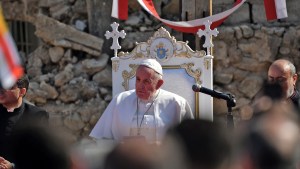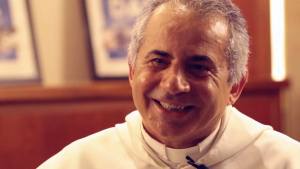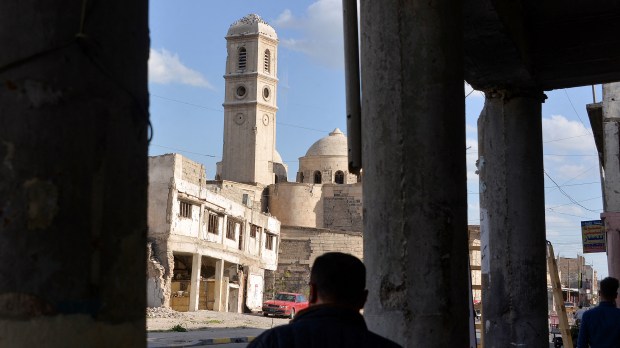In one of the last public prayers he offered in Iraq, Pope Francis pointed to two famous landmarks in the country’s second largest city, Mosul. Amid the rubble left by the Islamic State jihadist group, which used Mosul as its capital, and the battle to retake the city in 2017, the pope said that in a mosque and a neighboring church “we see two signs of the perennial human desire for closeness” to God.
The religious structures he pointed to were the 12th century Al-Nouri Mosque, with its Al-Hadba minaret, and the Church of Our Lady of the Hour, whose clock, he said, “for more than a century has reminded passersby that life is short and that time is precious.”
Our Lady of the Hour, a church and priory founded in the late 19th century by the Order of Preachers, or Dominicans, and known in Arabic as Al-Saa’a, has been the center of many spiritual, cultural and educational activities since then. “The church became a living example of the brotherhood between Moslawis, covering religious, cultural and social functions,” touted a Dominican website.
Mosul had been a mission of the Dominicans for some time already — a base for outreach to Armenia, Kurdistan and Mesopotamia. A seminary was established there, but because of the lack of good books for instruction, the friars established the first printing plant of Mesopotamia in Mosul.
At one point, there was a church, a school, and a hospital on the site. “They opened the school for boys, but also decided to open a school for girls,” said Fr. Olivier Poquillon, a Paris-born Dominican who now oversees the complex. “That was quite new. It was the first school for girls in Mesopotamia.”
Al-Saa’a is often referred to as the “Clock Church” due to the timepiece in its tower — a gift to the Dominicans from Empress Eugenie, the wife of Napoleon III of France. Al-Saa’a and Al-Nouri became “emblematic of the cultural diversity and peaceful co-existence between its communities,” the Dominican website said.
Fr. Poquillon, in a recent interview, noted that the clock had four faces, pointing to the four compass points, signifying “the universality of the hour. The hour is seen as a gift from God, shared by all of humanity.”
As the muezzin in al-Hadba (whose name means “the hunchback”) called Muslims to prayer five times a day, al-Saa’a’s bells reminded Christians of the Angelus at morning, noon, and evening. But it also marked the passing of each quarter hour throughout the day.
“Clocks were high technology in the 19th century,” said Fr. Poquillon. Empress Eugenie’s gift helped make Moslawis proud of their city. “Some old Muslim families tell me they were making silence every 15 minutes so they could listen to the bells,” the priest said. “They really want us to restore the bells.”
But both the church and the mosque were damaged during the ISIS occupation. The Dominican friary was looted and ransacked. ISIS smashed the faces of the clock, and destroyed the bells that had sounded for decades over Mosul. There is no trace of them now.
Human fraternity
In October 2019, two years after ISIS’ defeat on the battlefield, UNESCO, the U.N.’s cultural agency, added the rehabilitation of the mosque and the church to a project called “Reviving the Spirit of Mosul by rebuilding its historic landmarks,” along with the Al Tahera Syriac Catholic Church. The move was made at the request of the United Arab Emirates, following Pope Francis’s visit to Abu-Dhabi, where he and the Grand Imam of Al-Azhar, Ahmed el-Tayeb, signed a Document on Human Fraternity for World Peace and Living Together. UNESCO says the primary goal of the project, funded with a $50.4 million grant from the U.A.E., is to foster reconciliation and social cohesion in Mosul. The project includes skills development and job creation components.
Once rehabilitated, Al-Saa’a will serve both as a place of worship and as a community center for all of Mosul’s residents.
Social fabric
But more was damaged in Mosul than these material objects. In the 1990s, Mosul had been home to some 20,000 Christians, who were an integral part of the social fabric.
“Mosul’s prosperity came when there was some diversity,” said Poquillon, who is the Dominican representative for the reconstruction of the friary.
As in the rest of Iraq, Christians began leaving with the 1990 embargo and the 2003 war. The ISIS invasion only made the situation worse. In 2014, when “Daesh” took over, the vast majority of the city’s remaining Christians were expelled. Many fled to Erbil, the capital of the Kurdistan Region of Iraq, but many others emigrated to other countries in the Middle East and in the West. In spite of efforts to lure them back, fear and mistrust is difficult to overcome. Today, Fr. Poquillon reports, only 50-70 Christian families have returned.
But he also pointed out that a significant number of Christian students are coming back to Mosul University, which is “a sign of hope.”
At the Mosul gathering with Pope Francis on March 7, Gutayba Aagha, the Muslim head of the Independent Social and Cultural Council for the Families of Mosul, gave a welcoming address, urging Christian families to return to Mosul.
“In the name of the council I invite all our Christian brothers to return to this, their city, their properties and their businesses,” Aagha said.
Focus on learning
Apparently, his sentiments are not unique. Poquillon said that when he spoke with some youth at a meeting at the Great Mosque a few weeks ago, some of them said “We want our Christians to come back.” When asked why, they told the priest, “Because our grandparents told us that when we were living together, there was prosperity, and Mosul was the most prominent city in Iraq.”
In the past, Mosul was “one of the best educated cities in Iraq, and they were very proud of that,” the priest said. “The Sunni Arabs from the old families, the prominent families of Mosul, would like to restore this aspect of the city, focusing on education, focusing on living together, etc., and the pope’s visit was very instrumental in directly encouraging everybody to live together.”
Ed Clancy, director of outreach for Aid to the Church in Need-USA, said recently that Mosul had “one of the better medical programs in the Middle East. Before ISIS, there were 30,000 to 35,000 students at the university, and nearly a third of them were Christian. And yet, at the time Christians were probably less than 2% or 3% of the population. … So it shows you that the Christian presence in this country is important because they tend to be the ones who will be more educated, will be the professionals, will help to provide services at the higher end and help society make leaps rather than short steps in improvement.”
Part of Mosul’s educational scene was the very church complex that Fr. Poquillon oversees today.
“The man in charge of the Great Mosque, who spent eight years in a Catholic school of Mosul himself, told me, ‘I want to send my grandchildren to your school. I would like you to reopen the school.’”
In his speech in Mosul, Pope Francis commented: “The tragic diminution of Jesus’ disciples here and across the Middle East does incalculable harm not just to the individuals and communities concerned but also to the society they leave behind. Indeed such a richly diverse cultural and religious fabric as this is weakened by the loss of any of its members, however small.”
The rebuilding of Mosul’s religious sites “gives Christians and Muslims an opportunity to work together, and this is what we need in Mosul today,” Poquillon said. “As the great Mosque was built together by Muslims and Christians, our place can be restored today by Muslims and Christians. It’s a very good opportunity not only to rebuild stones and walls but to restore trust, trust having been more heavily damaged than the landscape.”

Read more:
If God is the God of life, we can’t kill in his name! Pope’s poignant prayer in Mosul

Read more:
Priest who rescued Iraqi Christian artifacts named Archbishop of Mosul

